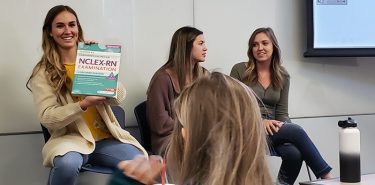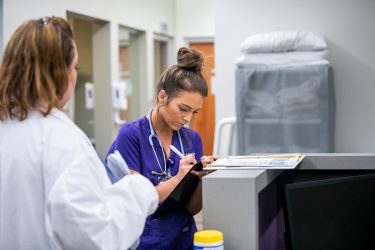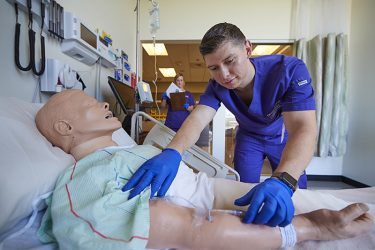
By Lana Sweeten-Shults
GCU News Bureau
Grand Canyon University Level 3 nursing student Kacey Butrovich knew about the daunting NCLEX (National Council Licensure Examination) even before entering nursing school. It’s the standardized test all nursing graduates must take before they can start working as a professional nurse.
To say she was intimidated by the thought of taking it is an understatement.

But every semester in GCU’s nursing program, she has taken standardized practice exams – called HESI (Health Education Systems Inc.) exams – and has passed every single one of them. She attributes much of her success to her professors and the curriculum.
“I no longer feel overwhelmed or intimidated,” said Butrovich, who has one semester to go before she graduates and takes “the biggest test of my life.”
The outlook is promising for Butrovich and her fellow GCU prelicensure nursing classmates when it comes to passing the NCLEX on their first try, considering recent nursing graduates’ impressive performance on the licensing exam.
GCU’s College of Nursing and Health Care Professions – which produces the largest number of licensed nurses in Arizona – had another strong NCLEX performance in 2019, finishing the year with an impressive 96.67% first-time pass rate for prelicensure students.
The score tops the 91.5% first-time pass rate achieved by GCU’s students in 2018. That’s a 5.65% increase from the previous year.

NCLEX scores are a gauge of how prepared nurses are to enter the workforce, and first-time pass rates are one of the calibers by which nursing schools are judged.
That significant rise in the percentage of GCU students passing the test in 2019 compared to 2018 shows how “we never remain stagnant or complacent,” said the college's dean, Dr. Lisa Smith. “We’re always looking to make improvements to further the success of program outcomes and to ensure our graduates are workforce ready.”
Students must succeed on the NCLEX before they can become a registered nurse.
Of the 360 tests delivered to the University’s prelicensure nursing students in 2019, 348 met the threshold to earn their license on their first attempt.
GCU’s year-end first-time pass rate also exceeds the state’s average first-time pass rate of 93%. In all, 3,015 of the 3,242 Arizona nursing school graduates who took the exam passed the test.
The University’s nursing students are achieving those solid test numbers at a challenging time in the industry, which is in the midst of a nationwide nursing shortage that is predicted to be tougher on certain states, including Arizona. The Bureau of Labor Statistics has reported that the U.S. will need more than 1 million new registered nurses by 2024 for expansion and replacement of retirees. Arizona is listed as one of 16 states to experience a nursing shortfall beyond that, through 2025.
Smith sees those high first-time pass rates, and the significant number of nurses the University graduates, as a way GCU is helping alleviate the nursing shortage. The more nurses that universities can get into the workforce, and the quicker they can do it, the better (GCU’s fast-track program is a 16-month endeavor).
Smith said the college set a goal in 2017 of achieving a 90%-plus first-time pass rate, which it successfully achieved in 2018 and 2019. Over the last 2 1/2 years, it has ramped up its efforts to help students be more successful on the NCLEX.

New this year was an increased focus on the exposure students receive in immersive simulation, Smith said.
The college's immersive simulation lab, which opened in spring 2018, transports students to what looks like an actual hospital floor, complete with four hospital rooms, two debriefing rooms, a nursing station, a room for at-home simulation and a control room.
The lab replicates real-world situations, often written by faculty members, that students might experience in their nursing careers.
Last summer, the college started using actors called standardized patients who, together with hospital training mannequins, make those real-life scenarios come to life even more than before.
The college's director of clinical operations, Heather Ziemianski, said GCU's spring 2019 graduates were the first to be exposed to immersive simulation throughout the entire clinical portion of the program. Each ensuing graduating cohort also participated in immersive simulation for all four semesters of that portion of the program.
"We received very positive feedback from the students, and the Immersive Simulation Resource Committee was able to identify additional learning opportunities," said Ziemianski.
As a result of the positive results and feedback, the nursing program received approval from the Arizona Board of Nursing to increase immersive simulation from 60 clinical hours for students to 152 clinical hours. This transition will take place over four semesters beginning in spring 2020.
"Students will now have at least one immersive simulation experience in every clinical course of the program," Ziemianski said.
Smith said the more time students spend in immersive simulation means the more exposure they have to high-level clinical reasoning, which is the kind of skill tested by the NCLEX.
Trina Staton, Associate Dean of the Prelicensure Bachelor of Science in Nursing Program, said another significant factor in the increased NCLEX scores is the integration of yet one more assessment tool, Elsevier Adaptive Quizzing, into certain courses. Faculty are requiring students to complete questions either as a ticket into class, as an assignment or as an in-class activity.
"Students are exposed more to NCLEX-style questions and content," said Staton. "We have noted since we have integrated the adaptive quizzing into the courses that students are even performing better on the HESI exams (an overall exam on that subject) given in certain courses."
In addition to those changes in immersive simulation, Smith said, “We are maintaining all the interventions we have already put in place.”
That includes naming a dedicated NCLEX Success Manager, Amy Leach, who coaches students one-on-one, tracks their performance on practice tests, intervenes when a student needs to improve their scores, reviews practice test scores with faculty and assesses how faculty might change strategies in their classrooms, just to name a few of the things she does.
The college also has hired faculty and administration with strong nursing experience, and students take practice standardized tests even more than before.
GCU nursing student Sarah Aguirre said on practice tests, the answers aren’t black or white. Students use their critical thinking skills to decide which answer would be best – their “priority action.” She has taken HESI exit exams for each course. If students don’t pass a HESI exam, they’re given workbooks and test-taking strategies to help them improve. Also, she said Level 4 nursing students take a course designed solely to help them study and prepare for the NCLEX.
“It may be intimidating seeing everything GCU puts on your plate, but realizing that it will help my preparation for the NCLEX has really helped me focus on my test-taking strategies,” Aguirre said. “I have definitely seen an improvement in the way I answer questions since Level 1.”
Butrovich, too, feels more prepared than ever to take that next big step in her career.
GCU’s nursing program, she said, “has shaped me into a critical thinker.”
GCU senior writer Lana Sweeten-Shults can be reached at [email protected] or at 602-639-7901.
****
Related content:
GCU Today: GCU Nursing continues to excel on national exam
GCU Today: Students help bridge transition for prenursing majors



































































